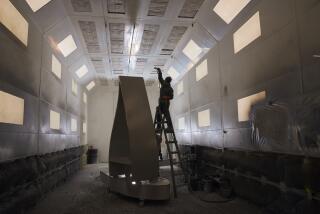Taking a Stand Against Use of Nuclear Energy : Greenpeace spokesman David Chatfield, a Santa Paula High alum, says his group works to promote alternatives.
- Share via
“The solution to our energy problems is conservation and renewable energy--not nuclear energy,” says David Chatfield, spokesman for the Greenpeace environmental organization in California.
He was responding to my inquiry about this week’s seizure of his organization’s protest boat, the Rainbow Warrior, by French commandos near France’s nuclear testing area in the South Pacific.
Chatfield, who attended Santa Paula High School and whose local roots go way back, was eager to explain why we should be concerned with these distant events.
“The nations of the world have agreed that further nuclear tests are not a solution to world security,” he says. Indeed, almost everyone agrees, except the French. But ironically, their “renegade” behavior, as Chatfield puts it, has made the nuclear issue much clearer to the general public--and put the nuclear age’s 50th anniversary on the world’s front pages.
That wasn’t the case with the testing of the first nuclear device 50 years ago this Sunday. That one was exploded in secret in the New Mexico desert in 1945 to see if the whole idea would work. It did, the world found out a few weeks later when two more nuclear devices were exploded over Hiroshima and Nagasaki.
Since then, the concept of nuclear energy as a war tool has risen and fallen in the public’s esteem--mostly as a prospect too horrible to contemplate. Occasionally, these thoughts have been supplanted by visions of nuclear energy as an unlimited source of cheap electricity.
Arguably, the atomic bomb shortened the war in the Pacific, preventing further casualties on both sides. Since 1945, it may have deterred a new world war. But it has also left us with a huge and vexing radioactive waste disposal problem because, whether used in war or just sitting in a warehouse, nuclear materials are the most toxic--and long-lasting--substances ever devised.
This year, the U.S. Department of Energy calculated that it will take $4 billion each year for the next several decades to dispose of America’s old nuclear bombs.
Furthermore, according to recent accounts in the press, the nuclear detritus of the Cold War is beginning to filter into the hands of criminals. As a recent article in the Christian Science Monitor stated, plutonium is as easily smuggled as heroin but much more valuable and deadly.
And nuclear power for electrical generation has been a bust from a business standpoint because it doesn’t seem to work without massive government subsidies. For the last 10 years, no American utility has ordered a new nuclear generator built, preferring cheaper means such as coal or the new, super-efficient natural gas technology.
And around the country, especially here in Ventura County and elsewhere in California, consumers and businesses have been switching to energy-efficient appliances and equipment rather than counting on construction of new generators of any kind.
In our state, such a volume of energy-efficient electrical devices were installed that, even as the economy expanded in the ‘80s, electricity use per person actually fell a fraction of a percentage point every year, according to the Rocky Mountain Institute, a Colorado-based energy-watchdog group.
Fifty years from today, we’ll still be in the atomic age, or at least paying for it--even though it may be buried and behind us.
More to Read
Sign up for Essential California
The most important California stories and recommendations in your inbox every morning.
You may occasionally receive promotional content from the Los Angeles Times.










